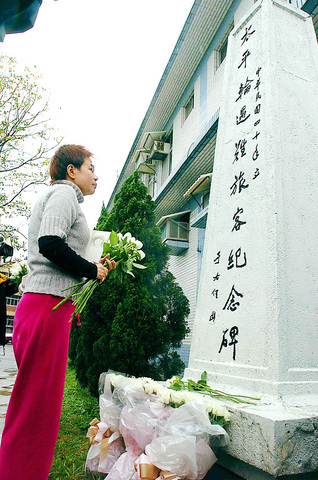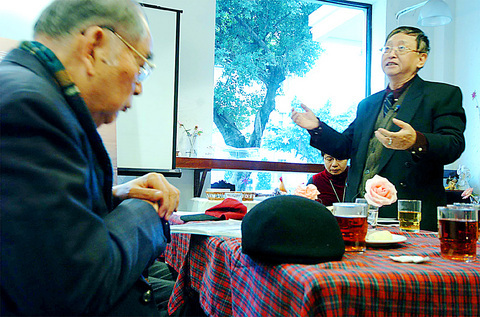It was the same day fifty-six years ago.
A tragic day before the festive Chinese New Year's Eve in 1949.

PHOTO: CHIANG YING-YING, TAIPEI TIMES
The sun was slowly setting on the Huangpu River. Dusk fell on Shanghai. News about the Red Army's victory and Nationalist troops' retreat were flying around town. As the night loomed closer, thousands of passengers swarmed the dock and elbowed their way up toward the Taiping Steamer, the last ship bound for Taiwan before the Lunar New Year. All 508 tickets were sold out, with most tickets snapped up by the rich and important. But the ship nonetheless loaded 1,500 passengers on board, and the Taiping Steamer finally weighed anchor and sailed for Keelung Harbor at 4:17pm.

PHOTO: CHIANG YING-YING, TAIPEI TIMES
Like 2 million other Mainlanders who fled the Communist forces in China, these emigrants crossed the Taiwan Strait in search of a safer life, not knowing when they would be able to go back to their war-torn homeland. Nor could they have imagined that the steamer they had waited so long to board would herald the end of their lives, rather than a the beginning of a new life.
Tragedy struck at 11:25pm. With its lights switched off and sailing quietly at a speed of 8 nautical miles per hour, the Taiping Steamer nudged through the sea in hushed night. The ship successfully escaped attack by the Communists, but the safety measures also prevented other boats from seeing it. A smaller boat, the Chienyuan Steamer, struck the giant 2,500-tonne Taiping Steamer in the darkness near the Zhoushan Archipelago.
Only 37 of the 1,500 passengers survived. Of the 74 crew members of the Chienyuan Steamer, only two were saved by a passing US ship, according to reports in the Taiwan Shin Sheng Daily News and the Shun Pao, a daily newspaper in Shanghai at the time.
According to the survivors and the bereaved families, the victims included military officials, a former provincial chairman, representatives of the National Assembly, bankers and jewelry merchants.
Many names of shipwreck victims were lost during the political upheaval and social chaos prevailing in 1949. Five decades on, the tragedy, comparable to the Titanic disaster, has been obscured by the passage of time. The sad tale is mostly passed down in stray fragments in individual memoirs, or lingers in the dimmest corner of some people's memory.
A 92-year-old survivor surnamed Yang recalls how he went out on a small boat to look for his wife's body.
"It was stormy and dark. The waves were high. We saw oil bubbling and bubbling on the sea. We knew it was right here. But we couldn't see anything but the oil," Yang said, his face reddened by a sudden rush of emotions.
According to Yang, he and other bereaved families continued searching for three days, but all efforts were in vain.
"I really don't know where my courage came from. It was a big turning point in my life. You know, I prefer not to talk about it anymore," Yang said.
For some who lost loved ones in the shipwreck, the unspeakable pain of the past is dulled only by the passage of time. Not many are willing to relive the unpleasant memories by recounting their stories.
Yuan Chia-chi (
"There is little that I know. We don't like to talk about it," Yuan said.
Yuan said that at the moment the ship tipped downward, everyone was crying for help. Cold water quickly poured in, silencing their screams.
"My husband is lucky. He held on to a wooden plank with two other people. They drifted for three days. Thank god he had a really thick military coat to keep him warm in the freezing water," Yuan said.
"It was so horrible. My heart still aches now when I think of it. So many people died, so many families were shattered," she said.
Although some have tried to forget, others remember the incident vividly. Shih Han-jing (
"Lee's story is all too fresh in my mind. He told me that he, his wife, and seven other people clung to a big wooden box. During the 10 hours they drifted aimlessly, one after another weakened and let go of the box. His wife didn't make it, either," Shih said.
"In the end, he was the only one left. He climbed up to sit on the box and just prayed and prayed," he said.
Now, as many survivors have passed away, taking their stories to the grave, the Taiping Steamer incident is almost a forgotten interlude against the larger backdrop of the Nationalist retreat to Taiwan in 1949. More than 1,000 of the victims' corpses were never recovered from the sea.
Scant documentation yields different versions of the event that took place.
According to The `Taiping Steamer' Accident (
Hsu says that, since martial law forbade any sailing after 6pm, the Taiping Steamer had to speed up and turn off all its lights to evade detection, rendering it virtually invisible.
In another account, written by Sheng Yuan-cheng (
Others put the blame on crew members' misconduct. The report "The Cause of the Accident" (輪船失事的原因) by Wang Gan-heng (王淦恆) in the Shanghai Ta Kung Pao on Feb. 4, 1949, claimed that most crew members were drunk that night.
"As China gained victory over Japan, marine companies have mushroomed. Demand for crew increased, yet most of the sailors are badly trained. Those who have passed mariner exams can take the helm of any ship," Wang wrote.
Lin Cheng-liang (
"I never heard that my colleagues on the Taiping Steamer were drunk. I feel deeply sorry for the loss of numberless lives. But I don't think it is right to accuse crew members of being drunk, even 50 years later," Lin said.
Despite conflicting viewpoints on the cause of the disaster, the tragedy did irreversibly change the course of many people's lives.
For the popular TV host Kevin Tsai (蔡康永), whose father, Tsai Tien-duo (蔡天鐸), owned the Taiping Steamer, the shipwreck forced the wealthy family into bankruptcy.
According to Tsai's essay The Titanic of My Family, his father's Chonglian Steamship Company could not afford to pay compensation to the thousands of bereaved family members. As legal disputes dragged on for years, two of the company's ships were locked in the port at Kaohsiung, while the remaining two ships in China were confiscated by the Communists.
For some, the accident was a lesson in adversity. The forensic scientist Henry Lee (李昌鈺), for example, lost his father in the calamity.
"I was too small to understand what I had lost. The news came on the [Lunar] New Year's Eve. I only knew my mother was very, very sad," Lee said in a recent interview with Phoenix TV, tears swelling in his eyes.
His father's death, Lee said, was the beginning of financial difficulties for the family, who had settled in Taoyuan in 1942.
"Since my father's death, my family's financial situation went downhill. Mother had to raise 13 children all by herself. I chose to go to the Central Police School merely because the tuition was free," Lee said.
"I think my father's death taught us, and forced us, to be diligent and frugal. In general, I think the accident is a collective memory shared by all Chinese in Taiwan, Hong Kong, the US, and elsewhere. It belongs to those who underwent the national turmoil and whose lives are influenced by it," he said.
For some people living in Taiwan, a search for the story of the Taiping Steamer has become a reflection of Taiwan's history and a quest for ethnic harmony.
"The Taiping Steamer tragedy is the sequel to the elegy of our ancestors. An elegy our ancestors sang when they started to cross the `Dark Current Course' (
"The 2 million Mainlanders who landed in Taiwan safe and sound and the 1,000 immigrants who failed to reach the shore are both a part of Taiwan's history. They are all Taiwanese," Yang said.
For Mainlanders in Taiwan and their offspring, the term "Taiwanese" may be simply an accident of association or a self-conscious choice of identity.
The writer Chang Dian-wan (
"When I showed my mother pictures from Shanghai and asked her if she wanted to go back, she shook her head, saying, `What's the use of going back to a country where your brother hanged himself during the Cultural Revolution?" Chang said.
Chang once asked her mother why she had her place of origin changed from Shanghai to Miaoli on her ID card in the 1970s.
"Your father is from Miaoli. I lived in Miaoli for so many years. Who says I am not from Miaoli?" she replied.

An essay competition jointly organized by a local writing society and a publisher affiliated with the Chinese Communist Party (CCP) might have contravened the Act Governing Relations Between the People of the Taiwan Area and the Mainland Area (臺灣地區與大陸地區人民關係條例), the Mainland Affairs Council (MAC) said on Thursday. “In this case, the partner organization is clearly an agency under the CCP’s Fujian Provincial Committee,” MAC Deputy Minister and spokesperson Liang Wen-chieh (梁文傑) said at a news briefing in Taipei. “It also involves bringing Taiwanese students to China with all-expenses-paid arrangements to attend award ceremonies and camps,” Liang said. Those two “characteristics” are typically sufficient

A magnitude 5.9 earthquake that struck about 33km off the coast of Hualien City was the "main shock" in a series of quakes in the area, with aftershocks expected over the next three days, the Central Weather Administration (CWA) said yesterday. Prior to the magnitude 5.9 quake shaking most of Taiwan at 6:53pm yesterday, six other earthquakes stronger than a magnitude of 4, starting with a magnitude 5.5 quake at 6:09pm, occurred in the area. CWA Seismological Center Director Wu Chien-fu (吳健富) confirmed that the quakes were all part of the same series and that the magnitude 5.5 temblor was

The brilliant blue waters, thick foliage and bucolic atmosphere on this seemingly idyllic archipelago deep in the Pacific Ocean belie the key role it now plays in a titanic geopolitical struggle. Palau is again on the front line as China, and the US and its allies prepare their forces in an intensifying contest for control over the Asia-Pacific region. The democratic nation of just 17,000 people hosts US-controlled airstrips and soon-to-be-completed radar installations that the US military describes as “critical” to monitoring vast swathes of water and airspace. It is also a key piece of the second island chain, a string of

The Central Weather Administration has issued a heat alert for southeastern Taiwan, warning of temperatures as high as 36°C today, while alerting some coastal areas of strong winds later in the day. Kaohsiung’s Neimen District (內門) and Pingtung County’s Neipu Township (內埔) are under an orange heat alert, which warns of temperatures as high as 36°C for three consecutive days, the CWA said, citing southwest winds. The heat would also extend to Tainan’s Nansi (楠西) and Yujing (玉井) districts, as well as Pingtung’s Gaoshu (高樹), Yanpu (鹽埔) and Majia (瑪家) townships, it said, forecasting highs of up to 36°C in those areas